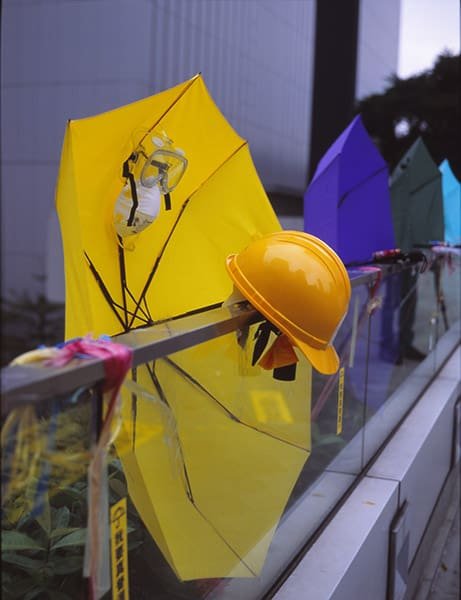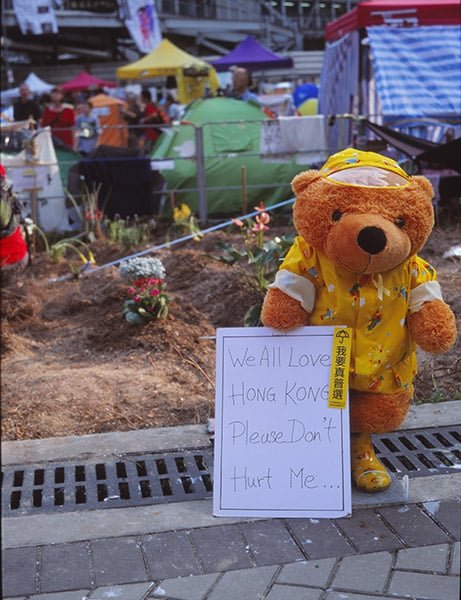Hong Kong 2019: the failure of Beijing's pseudo-democracy experiment


In 1997, Hong Kong was handed over from UK to China under so-called "one country two systems" principle. Since then, Beijing was trying to implement a pseudo-democracy system in Hong Kong. Citizens were allowed to express opinions which never really be considered. Every aspect of city governance was under full control. The result matched Communist Party's expectation over the first 20 years. But when it comes to the 22th anniversary, the experiment is now proved as a failure. The government completely lost their control over the youngsters, and trigger more people to fight back. How did the turning point happened?
Pseudo-democracy system
The 'one country two systems' principle promised that Hong Kong can retain capitalism after handed over to China in 1997. But that did not means that the Communist Party will loosen control over the city. There is no 'government of the people, for the people, by the people' in China. All government policies are planned and executed according to the design from the Communist Party. Thus since handover in 1997, an experiment was started in Hong Kong, seeking a method to retain the Party's full control, while meeting some basic freedom and democracy expectations from the local residents and the world. The Party wanted to show that Hong Kong is still a free society such that foreign corporation are willing to keep pouring capital into China through this international commercial metropolis.
In legislative council, only part of the seats are elected by the general public. Others are elected by particular groups of voters, which government has confident that Pro-Beijing candidate will be elected. Recent years the government even make use of unreasonable disqualification to filter out candidates which questions the policies of Beijing. By controlling majority seats in the council, the government retain full control to reject or pass any motion.
The government organisation, which once we proud of, had evolved into a gigantic machine which kept executing orders from chief executive (and the Communist Party behind) mindlessly. There are compliances that consultation must be held before they put up new policies. But in practice, all those consultations only produced reports which indicated they had received public opinion, but none of public opinion was actually taken into account. Whenever the people complains, the government would just reply 'please follow the official procedures', which will not produce any meaningful result.
Freedom of speech seems to remain open in Hong Kong, as the right is protected by law. But Chinese capital was penetrating deeper and deeper into various mass media corporation. As in all other industries, employees who speak the same words as their managers could have better promotion. Atmosphere of self-censorship was arising in media industry. Selective reporting affected what the public can perceived.
Beijing was trying to design Hong Kong that it imitated democracy structure, while actually the government retained full control on all aspect in ruling the city. On a general view, the city has all those system which a democracy society should have. But upon detail inspection, all those systems are fraud, which 'democracy' is only a facade to appease the public, to weaken the determination to strive for real democracy.
Partial success of the counterfeit

Over the first 20 years, the pseudo-democracy system seems a successful experiment. Countless policies are put in force brutally, ignoring objection from the public. The government always claim that they have carried out consultation as required, and gone through democratic procedures in legislative council. Voice from the public is 'included' (but not considered) in the governing procedures. Everything happens according to the designed 'democratic procedures', while the government achieved their desired outcome and fulfilled the tasks assigned by Communist Party.
If this type of 'state controlled democracy' can let the society runs strictly on designed course while minimize opposition from general public, it would be a good model for Beijing. The Communist Party started to persuade Taiwan that it can emerge with China while keeping a democracy system. They used Hong Kong as their reference model, which the pseudo-democracy achieved multiple goals: keeps the economy dynamo running, satisfying the democratic needs from the public, fulfilling the freedom standard of the western world, and most importantly, the Communist Party retain full control on governance.
There are mainly two opposite opinions among the people, which the pseudo-democracy system managed to handle both. By inspecting their thoughts and beliefs, they will give us hint why the governing result hit a turning point in last four years.
A. Pro-Beijing / Conservative
Although there are millions of people asking for real democracy, we cannot ignore the fact that there still exist many Beijing supporters in Hong Kong. Many citizens are impressed by the economical success of China in past decades, believing the Communist Party is improving and they can help the country grow strong. They welcome the existing system because Hong Kong can enjoy economical benefits by simply following Beijing's order. They are fine with the 'peace as long as you obey' principle. They accept the fact that under the rule of Communist Party, human rights only applies to Beijing supporters. Those who raise objection may disappear or being charged with make-up evidence. Maintaining our material living standard has higher priority over freedom and democracy.
B. Liberal
In reverse, another key type of view is liberals. The democratic reform before 1997 taught the people a important lesson. But since the city handover to China, people watched how the society kept deteriorating little by little. It is far from what we were promised. We express our opinion in public consultation. We joined rallies, protests, assemblies. We surrounded the legislative council, and even occupied roads around central government building. We put 'peace, rational, non-violance' as our leading principle. Some of our movements amazed the world, but not the local leaders. The unstoppable government machine sticked to its assigned course, no matter what we did. After trying all means to express our view, people are getting disappointed and tired, losing the determination to keep fighting for what we once aimed for. We are feeling hopeless, and that is what Beijing trying to achieve when they carry out the experiment.
Start of the turning point

In 2014, the government proposed a 'democratic reform', introducing a 'pseudo-universal suffrage' which candidates are filtered by the Communist Party. That leaded to the Umbrella Movement, which then trigger the turning point on the following years. The world maybe amazed by the people --- especially the students --- that how they occupy the road peacefully for almost three months. The shops and restaurants around the occupation area stay in business because they trusted that no one will break into them. But in the end the government still made no response to the public, that there was still no concrete plan for real universal suffrage for legislative council and chief executive.
The disappointing result caused profound impact to teenagers who either took part in the movement or followed closely. They learnt that the government would not take public opinions into consideration even hundred of thousands people joined a peaceful protest. They believe more actions are required to make our voice get heard and really affecting the city governance. The birth of this idea marked the effectiveness of the pseudo-democracy system started breaking down.
In 2016, a vigorous protest happened in Lunar New Year, where teenagers defend the once-a-year street hawkers in downtown area (some called it 'Fishball Revolution'). Most of those hawkers only gathered in downtown for a few days each year during Lunar New Year festival when the hawker control team were having their holiday. They sell traditional local food which somehow reminded us how people struggle for their lives in early Hong Kong. That year the government decided to take a strict disperse and charging action on hawkers, and turns out became a serious conflict between teenagers and police force. Teenagers organized themselves to defend the street hawkers area. Some of them even dig up bricks from the pedestrian and throw to the police. That was far beyond all protests since China took over Hong Kong. It was the first significant event which showed to what extend the teenagers believe how they would fight for their belief. That was their direct response to the government for completely ignoring public opinions for 19 years.
Interestingly, since 2017 government started to setup offical hawker area during Lunar New Year. For decades people request government not to strictly band hawkers, instead should introduce proper management. The government took no action until the conflict broke out, which gave a signal to the public that somehow vigorous conflict seems to be a effective way to urge the government take public opinions seriously.
Completely losing control over youngsters

Over the past 19 years, the government officials and upper class in the city believe it is the correct path for Hong Kong to merge into greater China. They deeply believe there exist no better future, except transforming Hong Kong into another China metropolis like Shanghai. But for the teenagers, they found there is no hope for the city if it becomes just another China city under Communist Party's rule. For them, losing the value of Hong Kong is the worst path to take, even if it gives economic benefits. Freedom, human right, justice and the desire for democracy constitute their identity as a 'HongKonger', and differentiate the city from mainland China. The current path chosen by the city leaders make no sense for them, but no one listen to them. We adults already shown that neither offical procedures nor peaceful protest can shake the determination of the city leaders. Youngsters are drowned in desperation, and thus believing that they have nothing else to lose for taking a higher risk to fight for their future.
The recent hot topic in the Hong Kong is that government want to pass the extradition bill which allows handover suspects from Hong Kong to China. Many people doubt that existing legal system under Communist Party's rule is far behind the standard of Hong Kong. The human right condition is so poor that foreign countries refuse to handover suspect to China. From lawyer society to commercial association to foreign ambassadors to general public, there are countless opposition and concerns on this bill. But the government still decided to pass the bill brutally, refuse to address concern from the public.
Many youngsters pay serious attention to this issue because it cause a great danger to Hong Kong if the legal system is directly linked to China. Communist Party may use make-up evidence to request extradition for people who raise objection on the Party. The bill put Hong Kong's freedom on huge risk. This trigger youngsters' determination to defend Hong Kong against further endless deterioration.
On 9-June, the liberals organized a huge rally which estimated 1 million people joined. Still, the government refuse to step back, and repeat that the extradition bill will continue to pass on 12-June. Then on 12-June the teenagers take action, occupying roads and surrounded the legislative council. Without any organiser, all discussion and decisions are made on Telegram chat group. Their tactics is 'be water', with key principle 'no blood, no injury, no arrest'. No one command the others. Everyone judge their own risk and decide their own action.
The protesters kept trying to enter the 'protest zone' of legislative council (which police blocks the entrance), and vigorous conflict occurs. The occupation was brutally suppressed by the police, as international media had widely reported. Countless tear gas, rubber bullet and bean bag are fired. One dangerous scene is that police force surrounded protesters from both sides of the road, forcing them squeeze into a nearby building, which nearly turns into a stampede disaster. But due to the high level of discipline and with the help of mobile technologies, the decentralised protesters managed to evacuate and minimized injuries. With the 'be water' tactics, the masses dismissed at night.
A few days ago government made no positive response to the 1 million citizens rally, but after 12-June they announced the extradition bill will be suspended. Similar to 2016, that the government only made meaningful response to public objections and opinions after vigorous protest took place. But the statement still haven't fullfil the public request (to withdraw the bill), the movement continues with many creative actions (e.g. kept singing hallelujah to police). The youngsters added 'no accusations' to their principle and advocate 'work on your own course', to stop the endless dispute on peacefulness of protest and to unite liberals in the city. Those who stick to peaceful principle stand with those who willing to take the risk of using force, respecting the choice of each individual.
Road towards our own future

This article is not going into details about how the decentralised protest evolve, nor judging the right and wrong of each actions taken in the movement. The key point to note is that the pseudo-democracy system no longer work on the youngsters. They already see through the trap of the meaningless constitutional procedures, which will only wasting our time. They even want to overthrow the legislative council, which 22 years had past but there is still no plan for universal suffrage for all seats. They are willing to take more risk to challenge the high wall, with courage and determination to act and response immediately, and intelligent enough to take advantage of latest technologies.
Taiwan had already learnt this lesson from Hong Kong, that such democracy is just a counterfeit. President Tsai clearly stated that Hong Kong experience shows that 'one country two systems' is not a way out for Taiwan. Real democracy will never happen under totalitarianism, which the leader can expropiate anyone at anytime. Youngsters show us their determination to defeat the fraud and fight for real democracy, stand up for what Hong Kong means to them. We can either find our own course and join the fight, or self hypnosis that Hong Kong is already having democracy, or stay asleep keep enjoying economic benefits from Communist Party.
Be water, my friend.
No blood, no injury, no arrest, no accusations.
End notes 1: The origin of the extradition bill is about a suspected murder case in Taiwan in 2018, which both victim and suspect are from Hong Kong. The suspect escape back to Hong Kong, and there is no regular extradition procedure between Hong Kong and Taiwan. A common misunderstanding is that the protesters in Hong Kong had forgot about the victim in the murder case. In fact, since this case happened in 2018, many people (including law society) had proposed much simpler way to handle this case. Taiwan Ministry of Justice had tried to contact Hong Kong Department of Justice to handle this as a single case, but receiving no response. The government refuse to communicate with Taiwan, and insist on pushing extradition bill which add both Taiwan and China into extradition target jurisdiction. Protesters are angry that the government make use of the murder case to execute political mission from Beijing.
End notes 2: As I am rounding up this article, I had got the news that the fourth death relating to this bill happened yesterday (or fifth if we include the young lady in 2018). Desperation is still growing among us, forcing some youngsters committed suicide. Wish all of us have the strength to carry on until the final destination.
Posted from my blog with SteemPress : https://hkxforce.net/wordpress/6225